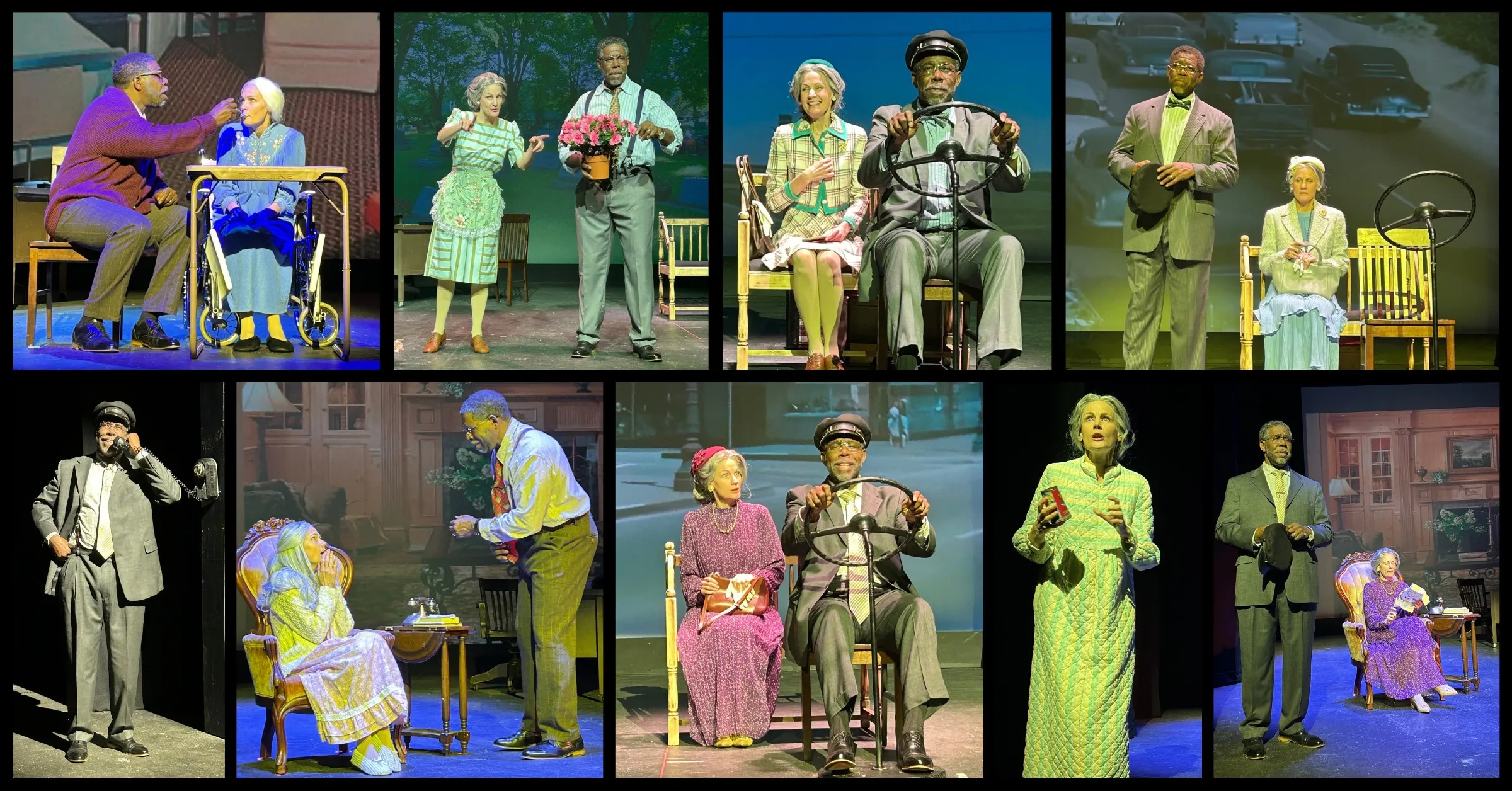JaxPlays applauds our sponsors. Join them.
'Driving Miss Daisy' at Theatre Jacksonville Captures the Timeless Journey of Dignity, Friendship, Trust and Change
Driving Miss Daisy at Theatre Jacksonville is an incredibly touching and beautiful production, effortlessly blending humor with poignancy. Set in Atlanta from the late 1940s to the early 1970s, it artfully and vividly chronicles the evolving relationship between Daisy Werthan, a headstrong Southern Jewish widow and Hoke Colburn, her patient and dignified chauffeur. As they navigate societal changes and personal growth, their deepening bond reveals layers of mutual respect and affection. Alfred Uhry’s Pulitzer Prize-winning play shines here, offering a heartfelt and profoundly moving exploration of prejudice and the transformative power of friendship.
Eugene Lindsey brings a warmly authentic presence to Hoke Colburn, making him an instantly relatable character. His naturalistic approach and strong Southern accent convincingly draw the audience into Hoke’s world without ever slipping into exaggeration. Lindsey’s steady projection ensures that every line resonates clearly and his portrayal of Hoke’s quiet dignity is both deeply moving and genuine. The subtle shifts in Hoke’s demeanor are skillfully and delicately conveyed, allowing the audience to witness the gradual blossoming of his relationship with Daisy into a deeply affectionate friendship.
Jen Mercer’s portrayal of Daisy Werthan is a standout, adding remarkable sophistication to the production. From the beginning, she fully captures Daisy’s fierce independence and stubborn nature. Mercer’s nuanced physical transformation is especially compelling; the trembling of her hands during needlecraft scenes subtly and powerfully reflects Daisy’s vulnerability and the struggles of aging. Mercer’s ability to take on physically challenging roles is always impressively evident, bringing a level of realism that beautifully enriches every scene. Her evolving voice and physicality perfectly and poignantly depict Daisy’s journey from a still sprightly older woman to someone gently burdened by the passage of time, making her performance truly unforgettable.
Alec Hadden shines as Boolie Werthan, bringing Southern charm and authenticity effortlessly to the stage. His performance is engaging and entirely believable, effortlessly capturing Boolie’s personality and mannerisms. While he might have been able to push the physicality of aging a bit further, his overall portrayal is nonetheless both compelling and integral to the production. The makeup and costume choices excellently and subtly mark his character’s progression through the years, adding to the overall believability of his role. Hadden’s natural chemistry with the rest of the cast also helps to ground the familial dynamics, making each interaction feel genuine and relatable.
The physical aspects of the set design are minimal and effectively executed, such as using a simple steering wheel, bench and chair to represent the car, easily capturing the essence of Hoke and Daisy’s shared journeys. However, Production Manager Michelle Kindy’s choice to incorporate video projections detracts from this simplicity. Instead of complementing the setting, the projections come across as a crude addition, feeling out of place and unrefined.
At first, the video projections are a welcome addition to the set design, establishing place and giving the production energy and movement; however, they quickly devolve as the show progresses. Several of the videos are glaringly in the wrong part of the country, such as the many clips filmed on the streets of Los Angeles, California which clash with the story’s setting in Atlanta, Georgia. At other times, the videos are obviously from the wrong century altogether with modern cars, LED christmas lights and street lights looking incongruously out of place. Additionally, several composite images of the cars in front of the house and other items added to the scenes are out of proportion and look poorly photoshopped, breaking the audience’s immersion. The most egregious mistake, though, is when the direction of the movement of the vehicle as projected on screen is the opposite of what it should be, creating a jarring disconnect.
As an advocate for the integration of technology like video projections into theater, I am disheartened to see such a poor execution. The resulting effect is a discordant layer that does not mesh with the storytelling. Theatre Jacksonville’s attempt to push boundaries with new technology is commendable, even if this execution misses the mark. It’s a promising direction that simply needs more finesse.
Conversely, Joy Smith’s costuming stands out as a masterpiece, each garment serving as a time capsule that immerses the audience in the era of the play. Far from being mere approximations, each costume is exquisitely tailored, reflecting an extraordinary level of craftsmanship. Daisy’s wardrobe, from her charming quilted nightgown to her sophisticated purple dress, is a visual journey that mirrors her character’s evolution. Hoke’s suits and the various stages of Boolie’s attire are equally telling, each stitch subtly marking the passage of time. This extraordinary attention to detail in costuming enriches the narrative, making each transition feel purposeful and deeply rooted in the narrative.
At its heart, this classic play is a poignant and heartfelt exploration of friendship and societal change. The cast delivers the evolving relationship between Hoke and Daisy with sincere authenticity and depth, making this a powerful and compelling interpretation of Uhry’s classic. This production warmly invites audiences on a continuous journey into the power of connection in the face of prejudice. It runs without an intermission, so settle in for an especially moving experience.
Driving Miss Daisy runs Friday, September 13 through Sunday, September 29 at the Harold K. Smith Playhouse.
For more information, full cast and crew credits and links to tickets, visit the Driving Miss Daisy page here on JaxPlays.
JaxPlays applauds our sponsors. Join them.
